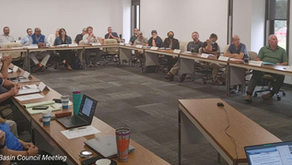Wetland Regulation by Press Release
- JD Solomon
- Feb 15, 2022
- 2 min read

North Carolina recently moved to regulate a class of "connecting" wetlands due to a permitting gap that resulted from the Biden Administration reversing course on rules adopted by the Trump Administration. A result is a form of "regulation by press release" due to state officials refusing to insert language limiting the use of the new regulations to the two years when a limited number of projects were not permitted under the Trump Rules. There is no future need for the new rules; however, state officials wanted the new rules on the books in case they are needed.
Dissenting Views
A wide consortium of the regulated community objected to the new rules, including the NC Chamber of Commerce, the NC Homebuilders Association, and the NC Manufacturing Association.
The essence of the groups' dissension taken from one letter is, "After the Commission’s initial action to move forward with additional permanent state wetland regulations, the Federal Courts along with the Biden Administration completely rolled back the Trump Administration’s Federal Rule (NWPR) by way of remand and vacate. It is now firmly established at the Federal level that wetlands are currently being regulated by way of a pre-2015 regulatory scheme. Since the Federal Rule (NWPR) cited in the Public Hearing was recently abandoned by the Federal courts and the Biden Administration, we attest that the previous justification for additional state wetland regulations cited in the Public Hearing notice no longer exists. The regulated community does not need State wetland regulations that are redundant to, and potentially more stringent than, existing Federal wetland regulations.”
NCDEQ Opinion
NCDEQ requested temporary rules in early 2021 to address the perceived permitting gap. Following the adoption of the temporary rules and after the notice of the new permanent rules, the Biden Administration and the US Army Corps of Engineers reversed course.
NCDEQ cited approximately 300 sites that were in potential flux in the permitting period of 2020 and 2021; however, the administration did not want to sunset the permanent rules in the event they were needed in the future. Moreover, the permanent rules tightened the impacted area thresholds over the previously adopted temporary rules.
Moving Forward
The North Carolina General Assembly’s Rule Review Commission (RRC) has to complete its review before the rules can be officially adopted. That action is expected in March 2022.
The North Carolina General Assembly also can statutorily pass measures to make the new permanent rule obsolete.
In the end, the new wetlands rules may be a good thing for the environment. The open-ended nature of the current rules, in anticipation of an unknown shift in Federal regulation over an indefinite period of time, is not. If a change in Federal wetland rules does occur in the next five years (or ten years, or 20 years, or 50 years), then temporary state rules can be readopted in short order again. Uncertainty is created by "regulation by press release" by the current course of action.
JD Solomon, Inc provides services at the nexus of facilities, infrastructure, and the environment. Our environmental services include project development, business case evaluations, and third-party reviews focused on reducing uncertainty and minimizing stranded investments.




Kommentarer